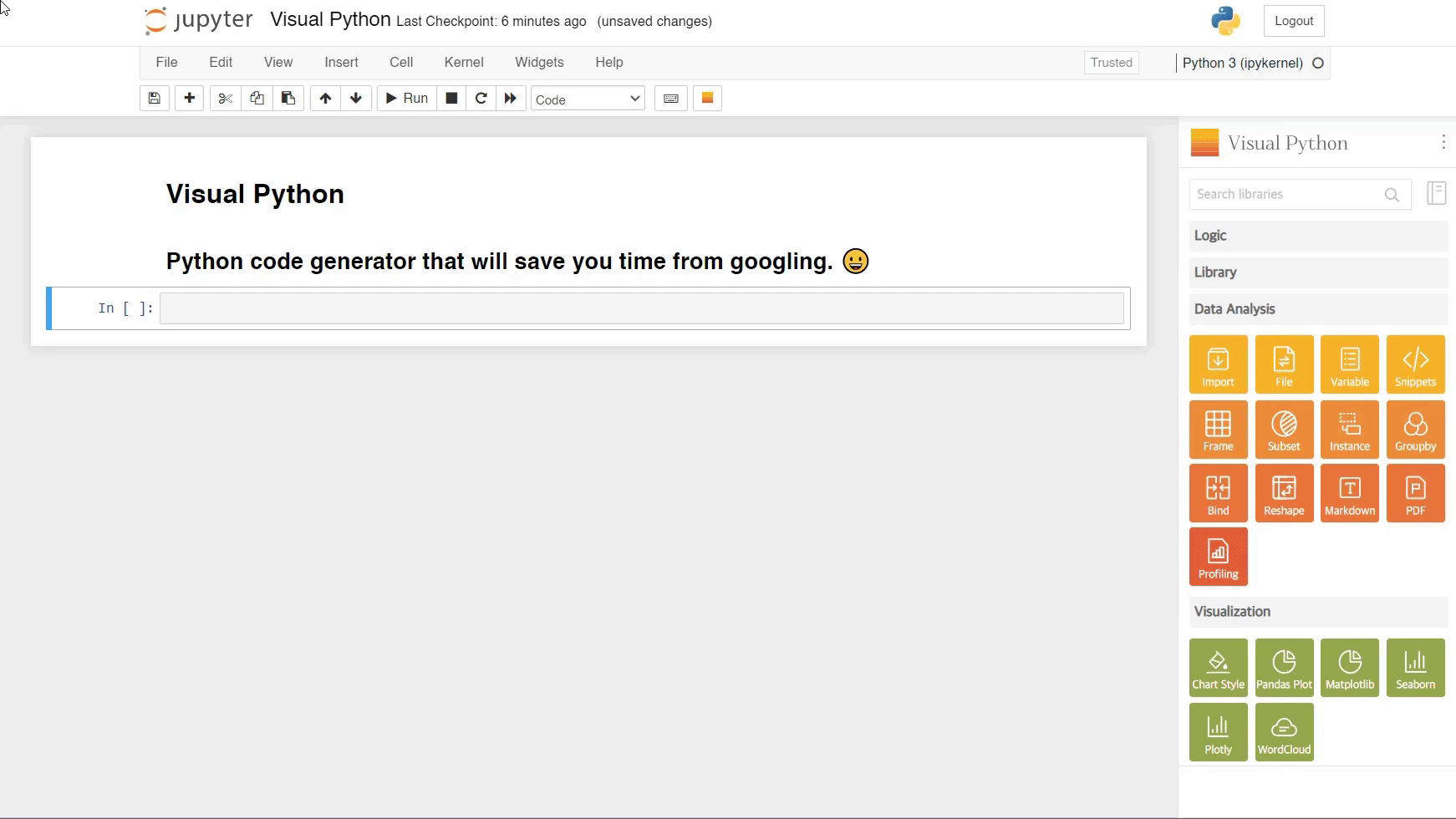
Security News
New CVE Forecasting Tool Predicts 47,000 Disclosures in 2025
CVEForecast.org uses machine learning to project a record-breaking surge in vulnerability disclosures in 2025.
Visual Python is a GUI-based Python code generator, developed on the Jupyter Notebook as an extension.

Visual Python is a GUI-based Python code generator, developed on the Jupyter Lab, Jupyter Notebook and Google Colab as an extension. You can also simply use Visual Python using Visual Python Desktop.
Visual Python is an open source project started for students who struggle with coding during Python classes for data science.
Try Visual Python if you would like to:

Visual Python is an extension to Jupyter Lab, so you must have Jupyter Lab installed already.
1) Install package from PyPI
pip install jupyterlab-visualpython
jupyterlab-visualpython==2.5.0
pip install jupyterlab-visualpython==2.5.0
2) Activate Visual Python on Jupyter Lab
Click orange square button on the right side of Jupyter Lab.
Visual Python is an extension to Jupyter Notebook, so you must have Jupyter Notebook installed already. You need latest version of Jupyter Notebook over version 7.x.x.
1) Install package from PyPI
pip install jupyterlab-visualpython
2) Activate Visual Python on Jupyter Notebook
Click orange square button on the toolbar of Jupyter Notebook.
Visual Python is an extension to Jupyter Notebook, so you must have Jupyter Notebook installed already. You need old version of Jupyter Notebook under version 6.x.x.
1) Install package from PyPI
pip install visualpython
2) Enable the package
visualpy install
3) Activate Visual Python on Jupyter Notebook
Click orange square button on the toolbar of Jupyter Notebook.
help - show help menu
install - install packages
uninstall - uninstall packages
upgrade - version upgrade
version - version check
Visual Python is an extension to Google Colab, so you must have Google Colab opened.
1) Install package using Chrome Web Store
2) Open Google Colab
3) Activate Visual Python on Google Colab
Visual Python Desktop is an installer to create an isolated jupyter environment and enable to use Visual Python easily.
It simplifies the process of configuring an independent Python environment, installing essential packages, and setting up a Jupyter environment, allowing users to focus on data analysis using python.
Download Visual Python Desktop installer from homepage.
Run the installer and follow the provided instructions for the installation process.
Use the shortcut created in Start menu or on Desktop to execute Jupyter Notebook (Visual Python), Jupyter Lab (Visual Python), and Visual Python Prompt according to your needs.
If you are interested in contributing to the Visual Python, please see CONTRIBUTING.md.
All skills from programmers, non-programmers, designers are welcomed.
Whoever wants to contribute or join our community,
You can contact us by creating issues on Issue page or using Discord server.
GNU GPLv3 with Visual Python special exception (See LICENSE file).
Mission
To support technology and education so that anyone can leverage big data analytical skills to create a variety of social values.
Vision
To create an environment where everyone can learn and use big data analytical skills easily.
Love Visual Python?
Your support will help us continue to actively develop and improve Visual Python.☕
FAQs
Visual Python is a GUI-based Python code generator, developed on the Jupyter Notebook as an extension.
We found that visualpython demonstrated a healthy version release cadence and project activity because the last version was released less than a year ago. It has 1 open source maintainer collaborating on the project.
Did you know?

Socket for GitHub automatically highlights issues in each pull request and monitors the health of all your open source dependencies. Discover the contents of your packages and block harmful activity before you install or update your dependencies.

Security News
CVEForecast.org uses machine learning to project a record-breaking surge in vulnerability disclosures in 2025.

Security News
Browserslist-rs now uses static data to reduce binary size by over 1MB, improving memory use and performance for Rust-based frontend tools.

Research
Security News
Eight new malicious Firefox extensions impersonate games, steal OAuth tokens, hijack sessions, and exploit browser permissions to spy on users.